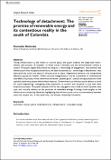Files in this item
Technology of detachment : the promise of renewable energy and its contentious reality in the South of Colombia
Item metadata
| dc.contributor.author | Helmcke, Cornelia | |
| dc.date.accessioned | 2023-03-31T15:30:11Z | |
| dc.date.available | 2023-03-31T15:30:11Z | |
| dc.date.issued | 2023-08-01 | |
| dc.identifier | 283848315 | |
| dc.identifier | 398f66bb-dd17-4777-9b7f-6506533a005b | |
| dc.identifier | 85152534997 | |
| dc.identifier.citation | Helmcke , C 2023 , ' Technology of detachment : the promise of renewable energy and its contentious reality in the South of Colombia ' , Environment and Planning C: Politics and Space , vol. 41 , no. 5 , pp. 976-992 . https://doi.org/10.1177/23996544231168390 | en |
| dc.identifier.issn | 2399-6544 | |
| dc.identifier.uri | https://hdl.handle.net/10023/27314 | |
| dc.description.abstract | Taking infrastructure as the means to control space, this paper analyses the large-scale hydroelectric dam project “El Quimbo” in Huila, South Colombia, and the environmental conflict it caused. The paper argues that instead of acting as a “technology of engagement” that extends vital infrastructure into marginalised territory, the dam functioned as a “technology of detachment” that destroyed the social and physical infrastructure in place, fragmented territory and marginalised affected populations further. While localised marginalisation can be considered an unintentional side-effect of a project, which otherwise serves the “greater good”, critical conceptualisations of the capitalist state see purpose behind these impacts. Governments use infrastructural objects as tools for social engineering, subjugating their population to control and discipline in line with their biopolitical project. The paper analyses how far this subjugation was visible in the El Quimbo dam case, and critically reflects on the promises of renewable energy. It brings novel insights to the infrastructure citizenship debate by highlighting that infrastructure can act as intermediary between state and citizens but, in the same way, can hamper citizenship formation. | |
| dc.format.extent | 17 | |
| dc.format.extent | 608740 | |
| dc.language.iso | eng | |
| dc.relation.ispartof | Environment and Planning C: Politics and Space | en |
| dc.subject | Colombia | en |
| dc.subject | Energy justice | en |
| dc.subject | Hydroelectricity | en |
| dc.subject | Infrastructure | en |
| dc.subject | Renewable energy | en |
| dc.subject | 3rd-DAS | en |
| dc.subject | SDG 7 - Affordable and Clean Energy | en |
| dc.subject | MCC | en |
| dc.title | Technology of detachment : the promise of renewable energy and its contentious reality in the South of Colombia | en |
| dc.type | Journal article | en |
| dc.contributor.institution | University of St Andrews. Centre for Energy Ethics | en |
| dc.contributor.institution | University of St Andrews. School of Geography & Sustainable Development | en |
| dc.identifier.doi | https://doi.org/10.1177/23996544231168390 | |
| dc.description.status | Peer reviewed | en |
This item appears in the following Collection(s)
Items in the St Andrews Research Repository are protected by copyright, with all rights reserved, unless otherwise indicated.

